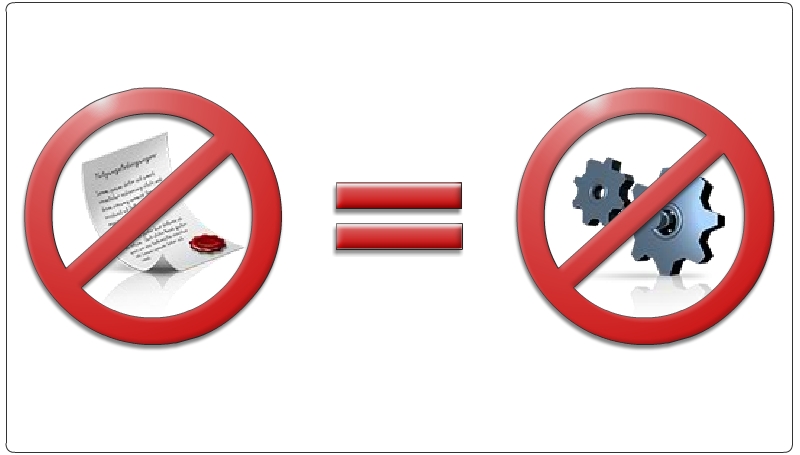As the year comes to an end we all start tying up loose ends and taking stock of the accomplishments and failures of our businesses over the past 12 months. I try to use the experience as an impetus to set goals for myself in the coming year. A look at past years’ lists of goals lead me to a very unpleasant conclusion. There is one item I have put on every list, every year since 2006. Why is it there every year? Because I always have at least one project every year that ends with a disagreement over payment of the invoice. The task item in question? “Do Not Perform Any More Work Without A Signed Contract.”
Why is this such a difficult task to accomplish? You would think that the next time someone wanted me to start work without a signed contract I would immediately remember how mad I got the last time I failed to receive full payment due to the lack of a contract. This should stop me in my tracks. But it never comes across that way. There is always a storyline involved where we have to scan when the plant is offline so there is no time to take care of the paperwork, or the details of the Scope of Work require me to crank out a proposal & methodology statement before the end of business that day – and be onsite by Monday! Maybe they are travelling and my part of the proposal has to be submitted before they are back in the office. Often I give my word that I will be onsite by a certain date and they tell me the contract is being processed and is on its way. When I don’t receive it, I hate not keeping my word, so I give them the benefit of the doubt. Or better yet, they agree to terms in an email chain so we have it in writing, right?! Maybe, but when an invoice goes unpaid and all attempts at cajoling, pleading, begging, and threatening have left you with no recourse save legal action, a precise calculation has to be made. What will it cost you to go after the money versus writing it off? Try taking a chain of email letters to a lawyer and their price jumps considerably. Face it, from the attorney’s perspective, it is a lot more work and open to much more interpretation compared to a signed contract or notice to proceed.
There is another factor to this calculation as well. There is a certain amount of money that it cost to pursue legal action regardless of the invoice amount; and clients know that. In the past this has lead me to move forward on “small” projects because even if I had a contract it would not be worth the cost to litigate payment. But now I think that this misses the point. Contracts are also a great way to educate your client about all of the steps that are necessary in order to produce the deliverable(s) that they expect to receive. Additionally, the written word offers a reference guide when questions and “scope creep” are introduced during the project. My goal this coming year is to think of them less as a hedge against dishonesty and more like an instrument of assured understanding.
For any of you out there that do owe us money, don’t worry. I’m not about to name names (as tempting as that may be!). However, I do want to let you know that we service providers do talk to one another. In fact, we’re a pretty small group worldwide and I think we tend to help each other more than clients would believe. That help is typically through online forums and emails with advice on data processing or field techniques, but it also includes general business conversations. Every year at the hotel bar associated with any of the major conferences like SPAR I have enjoyed some very interesting conversations regarding our industry. While we may be competitors in a strict market sense, the reality is that we all have more in common with each other than most of the other people we deal with on a day to day basis and this breeds a sort of esprit de corps. More than once I have been advised or advised others to be wary of particular clients. I am constantly amazed at clients that think they can jump from service provider to service provider, leaving the last invoice (or two) unpaid at each one. One day we may be as numerous and standardized as CADD drafters but we’re not there yet. I think clients would be shocked to hear how few individuals are responsible for the majority of the 3D models that come from point clouds, regardless of the company name associated with the data.
This year I’m going public with my goal of only starting work after I have a signed contract in hopes of finally being successful at keeping the resolution. It is very difficult to start a project forcing a client to place his attention on the details of business instead of the project at hand. It runs counter to my belief in customer service and brings up a lot of questions about trust between you and the client that neither of you wants to tackle head-on. Maybe I’ll just send them a link to this post! After all, we all want to work and the last thing I want to do is drive away a customer, but think about it. Have you ever lost a client because you wouldn’t start work without a contract? I don’t think that we have. Enforcing my resolution might change that, but if I replace unpaid invoices with lost work I think I’m coming out ahead.
Either way I hope you other service providers will join me. My commitment to contracts might help me a bit but it won’t help very much if they can just call the next service provider and get him or her to jump without a contract. Many of us started in this business when the first task with each client was to prove that the technology actually worked. Now the technologies that we use are beyond needing “Lunch & Learns” and other inducements to be marketable. However, many of us have not moved from the “specialist” to “commodity” mindset in how we interact with our clients. There is no doubt that A&E firms and asset owners would prefer to view our services as a commodity. I’m okay with that, but don’t take it personally when I want to see it in writing.





.jpg.small.400x400.jpg)
